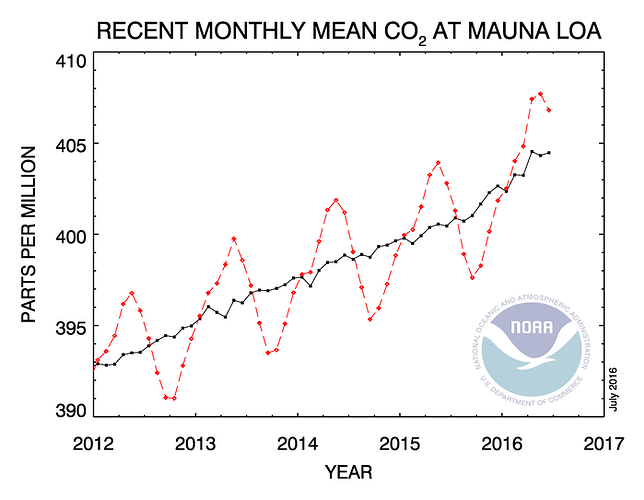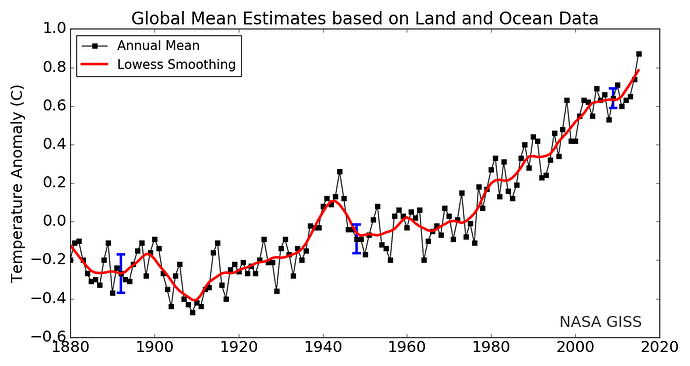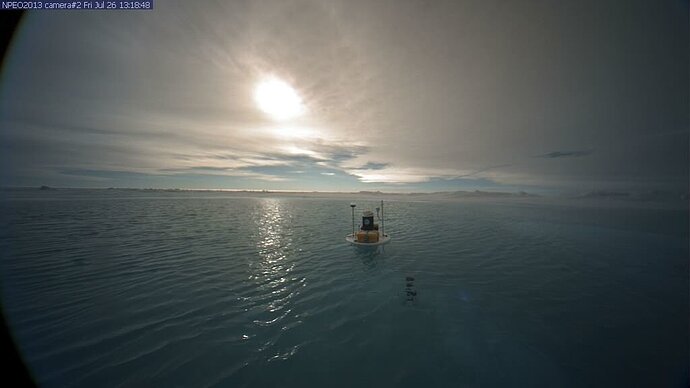True, but Iran had been really pro-US until their revolution, at which point they took hostages and kicked us out of the observation posts from which we’d been watching Soviet missile and space launches. Supporting them was a big scandal, even though it was probably just used as a lever to solve other problems. The government was juggling hostages in the Middle East with the wars in Central America, and it was a big mess.
A handy summary:
There’s been an assortment of additional evidence since that was made, of course. Kushner etc.
Despair is a paralytic. It is totally counterproductive. I’ve heard tonnes of people say, “Yup we’re screwed” and change absolutely nothing about their lifestyle to help stop climate change.
Unless it’s been watered down like a lot of other similar words.
I’d argue that it depends on where the despair is applied.
These are things that we should despair of:
- The idea that we can deal with climate change without major economic disruption.
- The idea that we still have time to prevent climate change from causing massive damage.
- The idea that market-based solutions can deal with the situation.
- The idea that a gradual movement towards sustainability is an adequate response.
- The idea that we can deal with climate change by altering personal consumption habits.
This is what we should not despair of:
- The reality that, if we act quickly, it is still possible to alter the trajectory and reduce the damage.
I don’t advocate surrender. I advocate a realistic appraisal of the situation and a response proportionate to the seriousness and urgency of it.
“Lifestyle” changes are completely pointless at this stage. Limiting your personal carbon emissions is nothing more than a symbolic gesture. The issue is systemic, not personal.
We need the coal mines shut down, and we need it done now.
Copied from an old post at the other place:
I am not a climate scientist, but I am a scientist. I know how to read the literature and interpret the back-channels of scientific opinion; I can tell the difference between “this is what we suspect might be happening” and “this is what’s happening”.
This is what’s happening:
James Hansen was the head of the NASA Goddard Institute for Space Studies from 1981 to 2013; he now runs the Program on Climate Science, Awareness and Solutions at Columbia University’s Earth Institute. For the last thirty years, Hansen has been repeatedly proven correct in his climate predictions.
For a layperson-readable but thorough background introduction, see Hansen’s Storms of My Grandchildren. Then consider that our complete inaction in the time since that was written has made the situation much, much worse.
In any sort of predictive natural science, absolute certainty is hard to come by; this is why we use things like p-values and error bars. Normally, as you refine your data over time, the error bars shrink towards the middle and the initial estimate turns out to be roughly correct.
This has not been happening with climate science. Across a wide range of studies, the error bars have been contracting towards the top of the range. The overall theme of climate science over the last decade is that the worst-case scenarios are coming true.
The major reason for this appears to be that there was a systematic bias towards excessive optimism. Nobody wanted their work dismissed as scaremongering, and journals were unwilling to publish any studies that weren’t conservative in their conclusions.
This is particularly the case with large, international collaborative efforts like the IPCC reports. Basically, nothing got into those unless pretty much the entire scientific community agreed with it. Again, this biases the results towards excessive conservatism.
The IPCC estimated 2-2.5°C as the maximum tolerable temperature increase. This, in itself, is probably over-optimistic; it is likely that 2.5°C is enough to trigger runaway positive feedbacks, and it will certainly cause mass human casualties. They also estimated 450ppm CO2 as the maximum atmospheric concentration allowable if we want to hold warming to that level. Again, this is almost certainly optimistic; Hansen argues that 350ppm is more realistic, and that even that level may be too high.
We blew past 350ppm quite some time ago. It’s over 400ppm now, and is still accelerating upwards. And, due to the persistent nature of CO2, it’s going to stay above 400ppm for a very long time, even if we stopped adding to it.
Which we haven’t.
We’ve only seen about 1°C of warming so far. Because the ocean acts as a buffering heat sink (among other reasons, but that’s the big one), temperature rise lags behind climate forcing. But that is only a temporary reprieve; after the ocean heats (buggering the reefs and fisheries in the process), the atmospheric temperatures follow. Even if we shut everything down today, we’ve got at least another few degrees “in the bank”.
You can see the trajectory of that here:
The youngest person on the planet who has seen a globally cooler-than-average month is 32 years old. These days, that story gets repeated every year with the age incremented by one.
A few degrees may not sound like a big deal, but it is. This is for two reasons:
-
Heat is energy. More heat, more storms, more hurricanes, more floods, more New Orleans, Sandy and Katrina. And much higher sea levels, from both melting icecaps and the expansion of water when heated. Say goodbye to every coastal city (i.e.: almost all of them).
-
Positive feedback mechanisms. There are a bunch of these, but for the most obvious: heat melts the icecaps, which reduces the albedo of the northern oceans, which in turn means we gather more heat from the sun.
This is what the North Pole has looked like during Summer for the last fourteen years:
Thanks to the positive feedback mechanisms, there are climate “tipping points”, where more heat triggers more warming in a runaway fashion. Because of this, it is very likely that there is no such thing as a 4°C warming, except as a waypoint that we rapidly pass on the way to 10°C or worse.
Given enough time, a runaway greenhouse could potentially lead to total extinction, but that’s not what I’m talking about. That’s the long-term threat, but we’re in deep trouble long before we have to deal with that.
The short-term threat of climate change is that it is a risk multiplier: it makes all of the existing problems worse. Famine, pestilence, war; the danger of all of these is enhanced by climate change, and they all feed into each other.
Food crops are both location and climate dependent. As the US rain band shifts north to the defrosting Canadian tundra, you can’t just shift the crops with it; the recently-thawed mud needs time to develop into proper agricultural soil. Shifting climate also trashes pollination mechanisms for wild flora and drives extinction of endangered species. Changing watercourses exacerbate already-dangerous shortages of potable water. Expanding tropical zones bring tropical diseases with them; you can already track the march of Dengue fever etc. southwards along the north Queensland coast.
For the most obvious example: almost all of Bangladesh is within spitting distance of sea level. On current rates, the country is likely to be largely uninhabitable (without Dutch-style water management, which the Bangladeshis don’t have the resources to implement) within a century. Bangladesh’s neighbours (India, China, Pakistan etc.) are all nuclear armed and have a history of military conflict. How do you think they’re going to react when 100 million Bangladeshi refugees land on their doorstep? What will India do if China attempts to divert all of the Bangladeshis to the south and vice-versa?
That’s just one example, but similar scenarios recur again and again across the world. And they’ll all be happening at the same time, substantially impairing the ability of the global community to respond to them.
Throughout history, most military conflict has ultimately been caused by competition over resources. Climate change, in the near future, is going to substantially damage the global food supply and the already-running-short supply of potable water. Desperate people do desperate things, and there’s nothing like hunger and thirst to drive desperation. Historically, starvation leads to revolution.
If you go talk to the academics who specialise in conflict studies, they’ll tell you that we’re already seeing the first climate-driven wars. So will the people in charge of medium-term planning for the militaries of the industrialised world. Marginal environments like northern Africa are the first to go, but it will spread beyond that with time. We live in an interconnected world; everything affects everything else.
The situation we are seeing now is not “the climate changing as it always has”. Yes, climates change over geological timescales; the slow pace has historically given the biosphere time to adapt (and, in the rare cases of sudden change like Chicxulub, the slow pace afterwards has provided time to recover). What we’re doing to the place is unprecedented in both its suddenness and its momentum. We’re driving the change way too fast, and there is enough momentum built up that it’s either too late to stop it or very close to that point.
The scientists ten years ago who were desperately trying to warn everyone that we needed to take immediate action or we’re all fucked? They weren’t wrong, and it wasn’t an ambit claim. If anything, they were sounding the alarm much too late.
If you aren’t scared shitless by climate change, you don’t understand the situation.
I’m sure this will have some impact on politics, somehow, somewhere:
http://www.bbc.com/news/av/science-environment-40573621/first-object-teleported-to-earth-s-orbit
TELEPORT ME OFF THIS DAMN PLANET PLEASE
Uhhhh not until they have it perfected:
…to another, better planet, where [fill in criteria]
Finishing the sentence is important. You don’t want to be orbiting Mercury without a spacesuit and a way to get back to habitation.
At this point, it would be like jumping out of a flaming skyscraper.
Seriously though, there is a lot of work that needs to be done before this technology can be considered viable. A photon isn’t much. It’s not a living creature, and does not even have mass. This is a great achievement, but I don’t exactly see people using this to travel, or even send packages, in the near future.
On the other hand, this is by far the furthest distance anything has ever been teleported. I’ve heard teleportation through quantum entanglement described as like encoding a message through random coin flips, so I’m impressed that anything at all can be teleported from one known location to another.
While still a (ahem) million miles away, quantum entanglement might be a method that breaks the fault (fridge horror) with most ‘SF’ teleportation, namely that the actual parts that make up ‘me’ need to be actually moved, not ‘encoded as data’ (or destroyed and recorded), transmitted (faxed) and re-encoded (a copy made) - otherwise we’re just building an identical copy at the other end, that has all my memories, but is a copy - the me that’s typing this now doesn’t care - I just got torn apart and my bits are in a waste box/recycling container somewhere.
Ironically, the show where this is most obvious is Star Trek, where there can be a delay between encoding/rebuilding, the data received can be edited, and duplication can occur.
The only fiction authors that come to mind as having methods that address this are Greg Bear, Howard Tayler and Harry Harrison (oh, and that Hugh Jackman movie dealt with the consequences.)
Algis Budrys’ Rogue Moon also deals with this
Aha! One to add to my reading list then. ![]()

BTW, got the Doris Kearns Goodwin book, “Team of Rivals” today. (Note to everyone else: I asked via PM for recs on a Lincoln book, and she happily obliged me.)
It’s my take that a lot of the trouble with Republicans that we’re experiencing today - Democrats, too, I expect, but not quite as damaging to the country and world as a whole - begins with the period before, during, and after the War Between the States.
This always kinda creeped me out.
https://en.wikipedia.org/wiki/The_Jaunt





